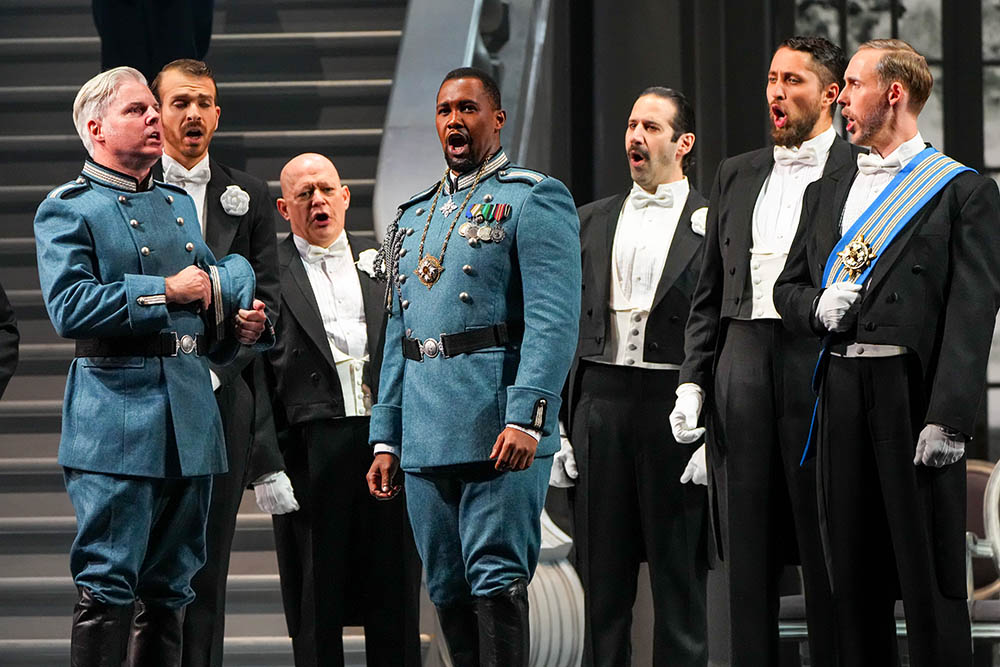
This is one for the life list if you’re an opera fan.
In between Shakespeare’s Othello (1603) and Verdi’s Otello (1887) comes the rarely seen/heard tragic opera by Rossini, a composer famous for his comic works. Rossini’s Otello premiered in 1816. One reason for its rarity is its demand for great tenors which, famously, are not thick on the ground; Rossini’s Otello requires not one, not two but three tenors in the huge heroic roles of Otello (Khanyiso Gwenxane), Rodrigo (Lawrence Brownlee) and Iago (Alex Shrader). (Well, it requires six tenors, if you count the Doge, Lucio, and the offstage gondolier.). So this is a daring undertaking for Opera Philadelphia—made more daring by color-blind casting— and it is a thrilling production.
And. as DAL has confessed before, I don’t have the arcane opera lingo with which to comment on the flourishes to arias and the various and wondrous effects great voices can achieve. All I can say with safety is that these singers are a rich and fabulous pleasure to listen to.
How can you have an Othello without the most famous handkerchief in all of literature? Rossini’s librettist, Francesca Berio de Salsa, took many liberties with Shakespeare’s plot, although to be fair, Shakespeare took liberties with his 16th century source. Instead of the handkerchief, there is a love letter sent by Desdemona to Othello with a lock of her hair and a promise of fidelity. When this letter is intercepted by Desdemona’s father and given to Otello’s rival, Rodrigo, the plot of jealousy and revenge rolls relentlessly over the lovers. Another surprise is that in the Rossini, Iago becomes a minor character and not the master manipulator we all know and love to hate, and with that change is the loss of the profound psychological drama the play gives us. I The opera ends, as it must, with the stage strewn with dead bodies.
The English sur-titles are clunky and florid—this language would not likely move us—but the director, Emilio Sagi has provided a powerful staging, giving these singers, with their gorgeous voices, a chance to act. Most remarkable is Daniela Mack as Desdemona whose stunning mezzo-soprano is matched by her surprisingly realistic acting, and it is she who gives genuine depth to the tragedy. Her maid, Emilia (Sun-Li Pierce) adds another wonderful mezzo voice. There is a tremendous moment, nearly at the end, when Otello, confused and enraged, murders his long-suffering and tormented wife. She is flung down across the stairway that dominates the set, and the men are so absorbed in their own misery that only the four helpless maids notice her corpse.
The orchestra, under Corrado Rovaris’ baton, is in splendid form; Rossini’s playful and spirited overture gives no clue as to the disastrous deeds to come, making the opera all the more moving.
[Opera Philadelphia at the Academy of Music, 240 S. Broad St] September 23-October 2, 2022; operaphila.org
Part of Festival O22

Rossini can you hear me? Written in 1816 and staged in 2022, Otello is a true musical feast. The orchestra is incredible. But a risk-free staging approach dominates the play. What was the reason for staging this play in the 1920s? I can’t help but think. An incredible simplicity and colorlessness destroys the excitement of the play. A monochromatic decor that serves no purpose is the columns surrounding 2/5 of the stage. Gray and blue costumes. One cannot help but ask what is the color of jealousy. Without Desdemona’s hair, it’s as if there was no color at all. Rodrigo, who drowns out everyone in duets and trios. Fortunately, there are Emilia and Iago, and we see that she can turn into a leading character in her side characters. If the choir didn’t make a sound in one or two places, it would seem like they wouldn’t be able to go on stage. Stairs that were literally used after Desdemona died. Is the opera stage just the place where singers go on stage and sing their songs? Is it necessary to use not the possibilities of the theater? Isn’t a symmetry an aesthetic perception necessary for the play ? Only the middle and right of the stage are used, why not the left? It is an indisputable fact that a classical work is long. But when a work written 200 years ago according to the wishes of that period is being staged again 200 years later, shouldn’t a dramaturge be needed? Anyway, let’s say life is short, art is long, performances are beautiful, and let’s end it here. #otello #operaphiladelphia
#operaphila #operaphilly #rossini